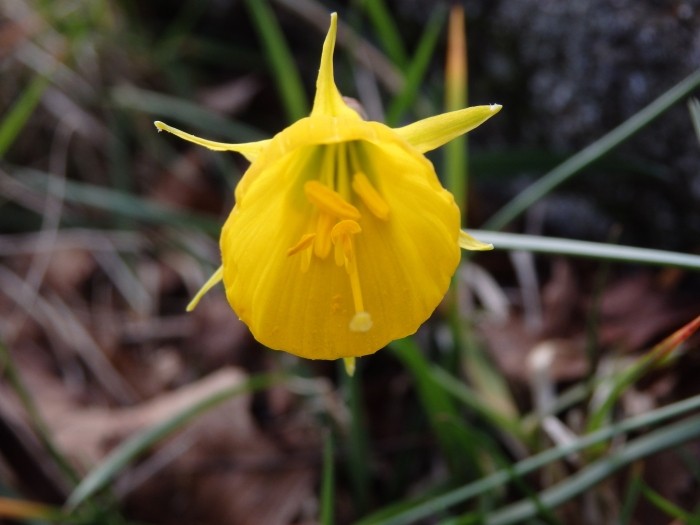Petticoat Daffodil
(Narcissus bulbocodium)
Petticoat Daffodil (Narcissus bulbocodium)
/
/

Carminda Santos
CC BY 4.0
Image By:
Carminda Santos
Recorded By:
Copyright:
CC BY 4.0
Copyright Notice:
Photo by: Carminda Santos | License Type: CC BY 4.0 | License URL: http://creativecommons.org/licenses/by/4.0/ | Rights Holder: Carminda Santos | Publisher: iNaturalist | Date Created: 2021-03-14T18:30:50-07:00 |























































Estimated Native Range
Summary
Narcissus bulbocodium, commonly known as Petticoat Daffodil, is a semi-deciduous perennial herb native to a variety of habitats including open woodlands, rocky outcrops, and grasslands in the Iberian Peninsula and North Africa. It typically grows to 10–15 cm (4–6 in) tall, with slender, grass-like leaves. The species is renowned for its deep yellow, trumpet-shaped flowers that bloom in mid-spring, with the central trumpet (corona) being exceptionally large compared to the tiny pointed segments of the outer section (perianth). With a floral diameter of just 12 mm, it boasts one of the smallest flowers among Narcissus species. The flowers are quite showy, particularly en masse.
Petticoat Daffodil is valued for its unique flower form and is often used in rock gardens, borders, and for naturalizing in grassy areas. It has a low maintenance profile and is suitable for planting beneath deciduous trees, where it can enjoy dry conditions during its summer dormant period. The plant prefers full sun to part shade and thrives in well-drained soils. It is drought-tolerant once established. Popular cultivars include N. bulbocodium subsp. bulbocodium var. conspicuus, with pale yellow flowers, and ’Golden Bells’, a vigorous cultivar with long-lasting deep yellow flowers. The species has been awarded the Royal Horticultural Society’s Award of Garden Merit for its garden performance. Potential issues include susceptibility to bulb rot in overly wet conditions and pests such as narcissus bulb fly, aphids, and narcissus nematode.CC BY-SA 4.0
Petticoat Daffodil is valued for its unique flower form and is often used in rock gardens, borders, and for naturalizing in grassy areas. It has a low maintenance profile and is suitable for planting beneath deciduous trees, where it can enjoy dry conditions during its summer dormant period. The plant prefers full sun to part shade and thrives in well-drained soils. It is drought-tolerant once established. Popular cultivars include N. bulbocodium subsp. bulbocodium var. conspicuus, with pale yellow flowers, and ’Golden Bells’, a vigorous cultivar with long-lasting deep yellow flowers. The species has been awarded the Royal Horticultural Society’s Award of Garden Merit for its garden performance. Potential issues include susceptibility to bulb rot in overly wet conditions and pests such as narcissus bulb fly, aphids, and narcissus nematode.CC BY-SA 4.0
Plant Description
- Plant Type: Herb
- Height: 0.7-1 feet
- Width: 0.2-0.3 feet
- Growth Rate: Moderate
- Flower Color: Yellow
- Flowering Season: Spring
- Leaf Retention: Semi-Deciduous
Growth Requirements
- Sun: Full Sun, Part Shade
- Water: Medium
- Drainage: Medium
Common Uses
Bee Garden, Butterfly Garden, Deer Resistant, Erosion Control, Low Maintenance, Potted Plant, Rabbit Resistant, Rock Garden, Showy Flowers
Natural Habitat
Native to open woodlands, rocky outcrops, and grasslands in the Iberian Peninsula and North Africa
Other Names
Common Names: Hoop Petticoat Daffodil, Påsktrumpet
Scientific Names: , Narcissus bulbocodium, Corbularia monophylla, Corbularia bulbocodium, Narcissus turgidus, Narcissus aureus, Narcissus bulbocodium subsp. vulgaris, Codiaminum minimum, Codiaminum montanum, Corbularia bulbocodium f. conspicuus
GBIF Accepted Name: Narcissus bulbocodium L.